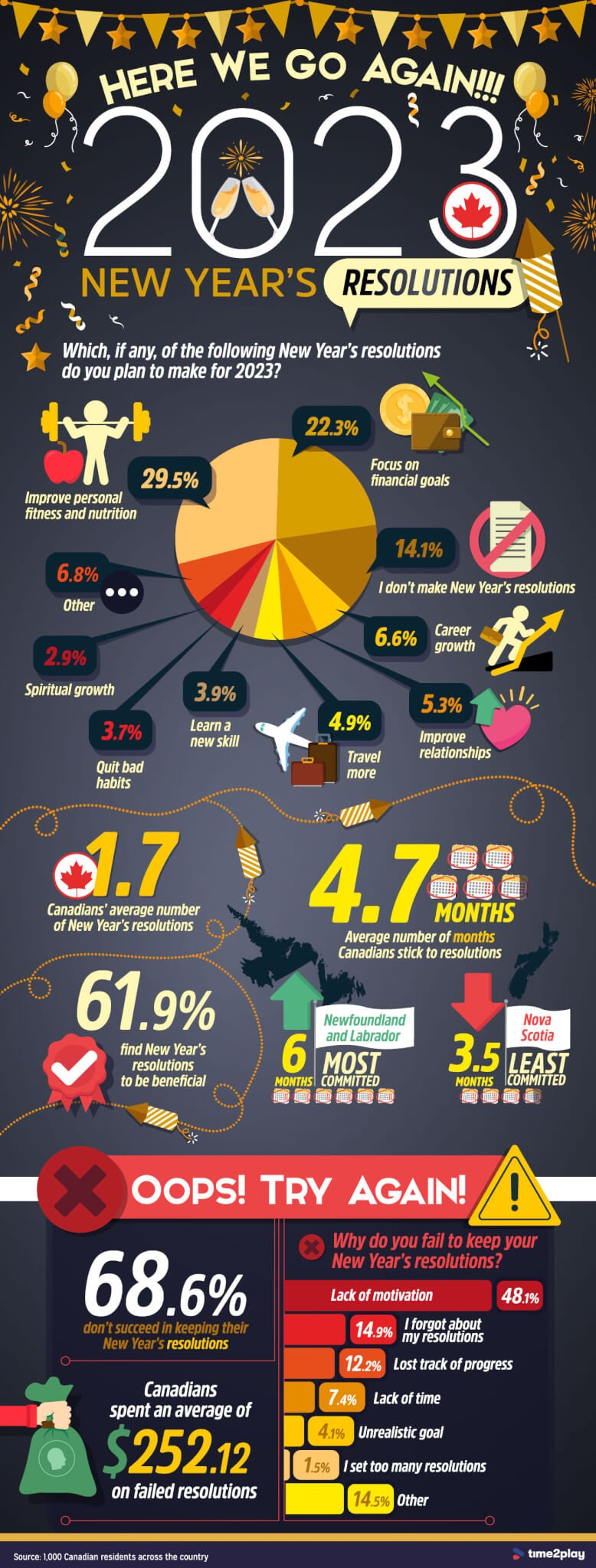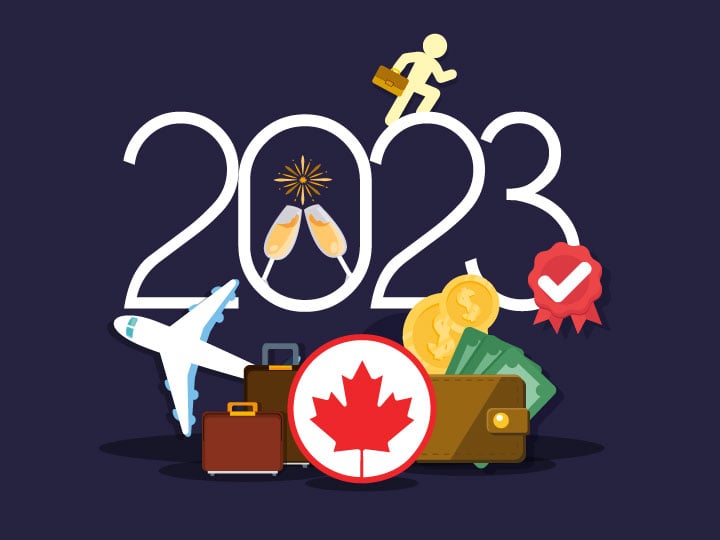Looking for the next up and coming online casinos? Check out our list of the best new online casinos in Ontario for 2023.
New Year’s resolutions – no matter how sure we are we’ll stick to them, the reality is most of us won’t be successful. But with 2023 only a couple of weeks away, we wanted to see what resolutions Canadians hope to achieve for the new year. But most importantly, how long are Canadians able to sustain their resolutions?

We asked 1,000 Canadians across the country the following question: “Which, if any, of the following New Year’s resolutions do you plan to make for 2023?”
The majority (29.5%) of Canadians are planning to improve their personal fitness and nutrition in 2023. Following closely behind, 22.3% intend to focus on reaching their financial goals – such as saving money, budgeting, investing, and/or settling debts. Just 14.1% of Canadians don’t make New Year’s resolutions.
Only 6.6% of respondents aim to grow their careers, while 5.3% hope to improve relationships with friends, family, and/or partners. A few (4.9%) plan to travel more while others (3.9%) intend to learn a new skill.
Quitting bad habits such as smoking, drinking, or other vices is the goal for 3.7% of our respondents. Some respondents (2.9%) hope to work on spiritual growth and others (6.8%) have other resolutions in the works.
Although we asked our respondents what their main New Year’s resolutions were, data shows that Canadians set an average of 1.7 resolutions each year. Perhaps this is because 61.9% of our respondents find New Year’s resolutions to be beneficial, rather than pointless.
The most and least committed provinces and territories
Our respondents tend to stick to their resolutions for an average of 4.7 months. We broke down our data even further to see which provinces and territories are the most and least committed to their resolutions.
The province most committed to their New Year’s resolutions is Newfoundland and Labrador – sticking to their resolutions for an average of 6 months. In second, Manitoba averages 5.4 months, while Quebec takes third for 5.1 months. Tied for fourth, both Alberta and Ontario typically stick with their resolutions for 4.8 months. To finish the top-five list, New Brunswick takes fifth with an average of 4.6 months.
Near the bottom of the list, Saskatchewan residents tend to reach 3.8 months before calling it quits. The least committed province for New Year’s resolutions is Nova Scotia, whose residents typically last 3.5 months before scrapping their resolutions.
The Northwest Territories, Nunavut, Prince Edward Island, and Yukon were not accounted for due to an insufficient amount of data available.
It’s the thought that counts
Despite the majority finding New Year’s resolutions to be beneficial, a whopping 68.6% of Canadians fail to stick with their resolutions. We asked our respondents the following question: “Why do you fail to keep your New Year’s resolutions?”
Almost half (48.1%) of respondents simply lack the motivation to keep their resolutions throughout the year. 14.9% end up forgetting about their resolutions, while 12.2% lost track of their progress.
A few (7.4%) claim they don’t have the time to continue their resolutions, and 4.1% said they set unrealistic goals for themselves. A small percentage of respondents (1.5%) found that they set too many resolutions. 14.5% failed to keep their resolutions for other reasons – such as not setting any resolutions to begin with, health struggles getting in the way, or running intotoo many roadblocks.
Because things don’t always go as planned, we asked respondents how much money they’ve invested in their New Year’s resolutions. The average Canadian has spent about $252.12 on failed resolutions these past years. Canadians have previously invested in gym equipment and memberships, travel plans, equipment for hobbies and skills, etc.
Methodology
We surveyed 1,000 Canadian residents across the entire country. The average age of respondents was 34.5 years old. The average annual household income of respondents was $102,119.47.
For media inquiries, please contact [email protected]
Fair Use
If you’d like to share this post or its assets with your friends or audience, you are welcome to do so. Please be sure you include attribution linking to this study.















